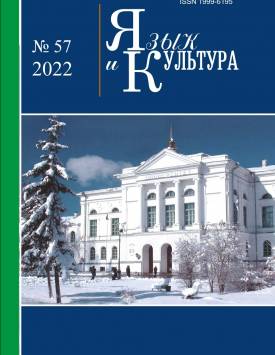A critique of the ideology of linguistic nativism
The article is devoted to the concept of “native speaker”, the complexity of the definition and its ideological foundations. The aim of the paper is to reconstruct the main points of linguistic nativism and critically revise the most important ideological assumptions of the concept of native speaker on the basis of the antifundamentalist approach to language as an emergent property of social interaction, rather than as a static system attached to ethnicity. Drawing on the theory of the semiotic mechanisms of the formation of linguistic ideology by Irvine, Gal, Scheifelin, Silverstein, and Woolard, three fundamental linguistic ideologies of the notion of native speaker are distinguished. The first ideological characteristic concerns the inseparable connection of this concept to the idea of a nation-state. At the same time, membership in the nation-state and the linguistic community is constructed by an ideological process of iconization. The article analyzes the role of language in nation-states, as well as the influence of the theory of the nation-state on the genealogy of the notion of native speaker. The article shows how the new forms of the state emerging at the beginning of the 21st century have an impact on the concept in question. The second ideological characteristic concerns the notion of homogeneity of the speech community, which, through the process of standardization, makes a clear distinction between a native speaker and a non-native speaker. This ideology emerges through the mechanism of erasing distinctions, turning entire groups of people who do not conform to ideological schemes into invisible ones. The article critically examines the hierarchical framing of such dichotomies as native/non-native, standard/non-standard, right/wrong language in connection with the process of standardization, which favors one form of language over others, limiting access to it to a large number of people. The third ideology automatically endows the “native speaker” with the highest and fullest level of competence in all spheres of his/her native language. This ideological premise is realized through the mechanism of fractal recursiveness, which projects the opposition, meaningful at one level of relations into another. The article criticizes the understanding of native speaker in the framework of transformational generative grammar on the basis of its postulation of the superiority of psychological knowledge on language over social practice. It discusses the relationship between the concept of native speaker and such concepts as first language, mother language, native language, and standard language. As a result of this analysis, we can say that the concept of a native language speaker remains largely undefined. A systematic analysis of the concept of native speaker in terms of its ideological foundations shows that the definition of native speaker can be given exclusively by extralinguistic means. This gives full grounds to consider this category as a social construct. As a result, it is argued that there is an urgent need for alternative criteria for categorizing people in relation to their linguistic activities. This need is based on the modern understanding of the heterogeneity of linguistic practices, which no longer lend themselves to traditional cataloguing. Classifying people in terms of speakers/non-speakers of languages, leads to a significant distortion of the realities of the contemporary world.
Keywords
native speaker, non-native speaker, mother language, standardization, language ideology, first language, second language, national stateAuthors
| Name | Organization | |
| Naiman Evgeny A. | National Research Tomsk State University; Tomsk Scientific Center of the Siberian Branch of the Russian Academy of Sciences | enyman17@rambler.ru |
References

A critique of the ideology of linguistic nativism | Yazyk i Kultura – Language and Culture. 2022. № 57. DOI: 10.17223/19996195/57/6
